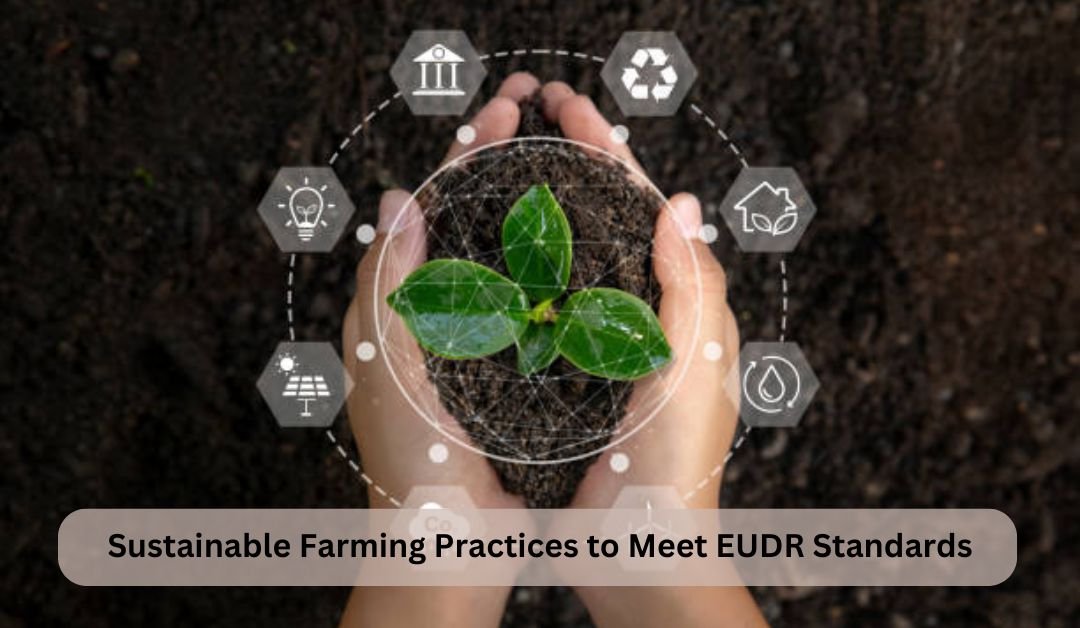Farming is essential for feeding people, but it can also harm forests and the environment. To address this, the European Union (EU) created the EU Deforestation Regulation (EUDR). This law makes sure products sold in the EU are not linked to cutting down forests. Farmers need to follow sustainable agricultural practices to meet these rules and protect nature. Farmers can help create a healthier planet and keep their businesses thriving by making small but meaningful changes.
What Is the EU Deforestation Regulation?
The EU Deforestation Regulation is a rule to stop deforestation caused by farming. It applies to products like soy, coffee, cocoa, rubber, and beef. Businesses must show that their products come from farms that don’t harm forests. This helps save trees, protect animals, and fight climate change. The regulation also aims to ensure that supply chains are transparent and traceable, making it easier to identify and eliminate deforestation-linked practices.
What Are Sustainable Agricultural Practices?
Sustainable farming means growing food in ways that protect nature and keep the soil healthy for future use. These practices save resources, protect animals, and make farming better for the planet. They also improve the resilience of farms to climate change, ensuring long-term productivity. Here are some simple methods farmers can use to meet EUDR standards.
Easy Ways to Meet EUDR Standards
- Plant Trees with Crops: Mixing trees with crops or animals is called agroforestry. It keeps forests safe, makes soil better, and provides shade for plants and animals. This practice helps farmers earn more while protecting the environment. For example, farmers can grow fruit trees alongside coffee plants, increasing their income streams.
- Change Crops Regularly: Growing different crops each season is called crop rotation. It keeps the soil healthy and reduces pests. Farmers can also grow several types of crops together to make their farms more diverse and productive. This method saves money and protects the environment by cutting down on the use of artificial fertilizers and pesticides.
- Use Smart Farming Tools: Farmers can use tools like drones or sensors to monitor their crops and soil. These tools help save water, reduce waste, and make farming more efficient. This is called precision agriculture. For example, drones can scan fields to detect areas that need water or fertilizer, reducing overuse and improving yields.
- Use Less Chemicals: Using natural fertilizers and pest control instead of chemicals is better for the soil and water. This protects nearby forests and animals. Organic compost and biological pest controls, like ladybugs, can be effective and eco-friendly alternatives.
- Save Water: Farmers can use methods like drip irrigation and rainwater storage to use water wisely. This keeps crops healthy and prevents water waste. In areas with low rainfall, storing rainwater for irrigation during dry months can make a big difference.
- Get Certifications: Certifications like Fair Trade or Organic Farming show that a farm follows good practices. This helps farmers prove their products are sustainable and meet EUDR rules. Certified products often fetch higher prices, providing additional income for farmers.
- Protect Wildlife: Farmers can leave some areas of their land for wild plants and animals. This helps keep nature balanced and reduces the need to clear forests. For instance, maintaining buffer zones around forests can provide habitats for animals and reduce human-wildlife conflicts.
- Fix Damaged Land: If land has been overused, farmers can plant trees and add nutrients to the soil to make it healthy again. This stops the need for cutting down more forests. Techniques like planting cover crops can restore soil fertility and prevent erosion.
- Work with Others: Farmers can team up with local communities and organizations to learn and share better ways of farming. Training and support make it easier to follow EUDR standards. Collaboration can also help small farmers access resources and technologies that may otherwise be out of reach.
Why Follow EUDR Standards?
Following EUDR rules has many benefits:
- Better for Nature
- Saves forests and animals
- Keeps water and soil clean
- Reduces harmful gases like carbon dioxide
- Good for Farmers
- Opens doors to sell products in the EU
- Earns higher prices for sustainable goods
- Saves money by using resources efficiently
- Helps Communities
- Supports fair treatment of workers
- Protects future food supplies
- Builds stronger farming communities and local economies
Challenges and Solutions
Some farmers may find it hard to follow EUDR rules because of costs or lack of knowledge. Here’s how they can overcome these problems:
- Get Support: Governments and organizations can provide funding and training. Programs that offer grants or low-interest loans can make sustainable farming more affordable.
- Use Simple Tools: Affordable technology can help track and manage farming activities. For instance, mobile apps can help farmers record their practices and provide evidence of compliance.
- Learn Together: Farmers can join groups to share knowledge and resources. Community-based workshops and farmer cooperatives can make it easier to adopt sustainable practices.
Conclusion
Sustainable farming helps protect the planet while keeping farms productive. By planting trees, saving water, and avoiding chemicals, farmers can meet EUDR rules and make a positive impact. The EU Deforestation Regulation is a chance for farmers to create a greener future and protect forests for everyone. Working together, we can make farming better for the earth and future generations. By adopting these practices, farmers not only comply with regulations but also ensure their land remains fertile and productive for years to come.



